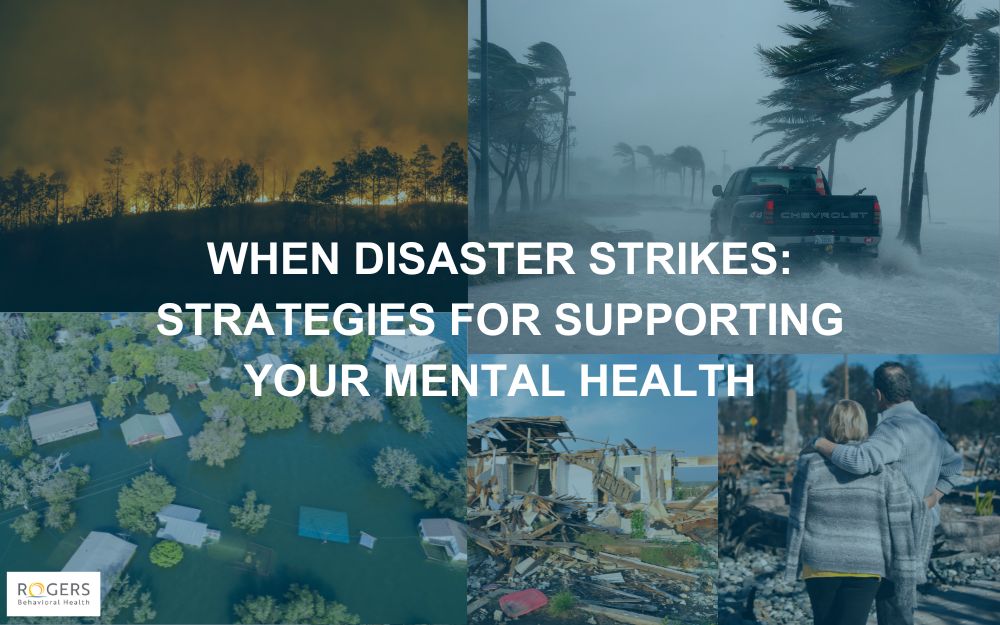 By Merari Flores Saldana, RCSW and Claire Kinney, MA, LMHC, CRC, NCC at Rogers Behavioral Health in Tampa
By Merari Flores Saldana, RCSW and Claire Kinney, MA, LMHC, CRC, NCC at Rogers Behavioral Health in Tampa
Life is unpredictable and when disasters happen, they shake us to our very core, affecting our sense of safety and well-being. In light of the wildfires in Los Angeles, Rogers’ Merari Flores Saldana and Claire Kinney share what they learned while weathering hurricanes Milton and Helene.
How do disasters impact a person’s mental health?
 In the face of adversity, disasters, and loss, people experience many emotions —fear, anxiety, anger, sadness, guilt, despair, loneliness, vulnerability, overwhelm, and grief. People’s reactions to trauma are as unique as they are. These emotions often arise before a disaster—when there’s advance warning, such as with a hurricane—during the event itself, and in the aftermath as we begin to process its impact.
In the face of adversity, disasters, and loss, people experience many emotions —fear, anxiety, anger, sadness, guilt, despair, loneliness, vulnerability, overwhelm, and grief. People’s reactions to trauma are as unique as they are. These emotions often arise before a disaster—when there’s advance warning, such as with a hurricane—during the event itself, and in the aftermath as we begin to process its impact.
Of course, people can experience what we consider to be more positive emotions, such as optimism, hopefulness, pride, and thankfulness. People may be grateful for what they still have, or that the disaster was not as bad as anticipated. They may find hope in the road ahead to rebuild, and they may feel a sense of belonging and pride in the way their community or families step up to assist in disasters.
Like with the current fires in LA, people can respond in different ways. The trauma can lead them to fight for their lives or homes, freeze—feeling numb or even paralyzed with fear—or flee to survive. Those in the surrounding areas might be experiencing anxiety about the potential impact for themselves and their loved ones. Some may immediately feel grief after witnessing loss, while for others, grief may be delayed until their bodies have had time to recover from the fight, freeze, or flight response to the trauma.
What kinds of mental health challenges are common with disasters?
Adults and kids often respond in remarkably similar ways to stressors. Fear, anxiety, and grief are painful and uncomfortable emotions. As humans, it’s natural to want to avoid them—we’d all rather not feel them if we had the choice. Our mind and body are wired to keep us safe and help us survive, so it makes sense that our first response is often to avoid or distract ourselves from those feelings. But avoidance, while it feels protective in the moment, can actually lead to mental health challenges like depression, anxiety, and PTSD over time. Research shows that resilience is possible. By seeking support and allowing ourselves to face those tough emotions, we can grow stronger in the face of adversity.
Symptoms of depression and anxiety can look like:
- Hypervigilance
- Too much or too little sleep
- Loss or increase in appetite
- Feelings of sadness, hopelessness, despair, or isolation
- Substance use
- Increased attachment to caregivers (common among children)
Living in a hurricane-prone state, these experiences are common for our coworkers, ourselves, and the people who receive treatment at our clinic. As strong as the unwanted emotions like fear and anxiety are, more positive emotions that come from the community efforts to rebuild are just as powerful and have the potential to lead to resilience.
When might these challenges appear?
Most people experience fear and anxiety when a disaster is looming or unfolding. Afterward, fatigue and sadness often set in as people begin to process what happened. But it’s important to know that many emotional and mental health symptoms can emerge weeks or even months later—and they might not seem directly connected to the disaster at first. For example, in the Tampa Bay area where our clinic is located, the hurricanes caused widespread damage and displacement. With little time to recover between storms, many people found their emotions and symptoms surfacing only after the second hurricane had passed.
What should a person do if they’re struggling?
If someone is struggling with their mental health:
- Understand that your emotions and reactions are normal. Disasters are incredibly stressful and triggering for anyone, especially for those already struggling with their mental health.
- Reach out to people in your support system.
- Schedule an appointment with a mental health provider. While they can’t fix the issue or provide an immediate solution, they can listen and help you feel less alone.
- Consider serving your own community to give back and increase your sense of purpose and control.
- If you’re experiencing a mental health crisis, call or text the 988 Suicide and Crisis Lifeline 24/7 or go to your nearest emergency room.
Remember that just because a person isn’t physically injured, their family is safe, and they still have their home does not mean that the disaster was not traumatic. There is no one-size-fits-all for how people respond, so seek the help you need.
How can people support someone struggling with mental health after a disaster?
As always, community support is vital. In disasters, most people recognize the need for physical support: search and rescue efforts, food donations, volunteer efforts, etc.
However, psychological support is just as important. You can:
- Offer to be there for those in your life who need support. Something as simple as lending a helping hand or a sympathetic ear can go a long way.
- Ask the person how you can best support or help them.
- Consider getting certified in Mental Health First Aid. This allows you to be trained to respond to the mental health needs of those in a disaster and you can volunteer your time to respond to disasters in your area.
How Rogers can help
When you’re ready, we are here to help. Call 800-767-411 for a free, confidential screening.


